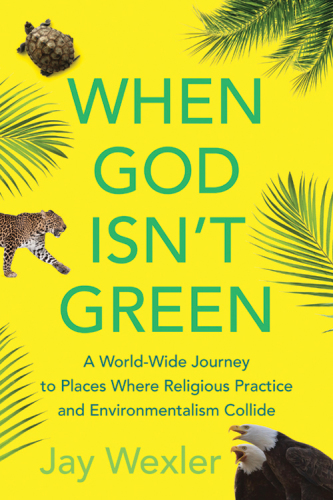
When God Isn't Green
A World-Wide Journey to Places Where Religious Practice and Environmentalism Collide
کتاب های مرتبط
- اطلاعات
- نقد و بررسی
- دیدگاه کاربران
نقد و بررسی

January 11, 2016
Boston University law professor Wexler offers a highly entertaining and eye-opening look at situations where freedom of religion and environmental protection clash. From harvesting palms in Guatemala and Mexico for Palm Sunday to the massive burnings of joss in Singapore, Wexler portrays both sides of the debate as sympathetic and deserving of fair treatment. For example, should whaling (when practiced within reason) be allowed for the Inupiat people, for whom the Nalukataq whale hunt not only provides enormous quantities of resources but also serves as a powerful aspect of their religion? Wexler is often lighthearted in tone, but he conveys the gravity of harming either the environment or the vitality and vibrancy of a religious culture with uncritical legal regulation. Though he directs this work mainly toward governments and nongovernment organizations, religious and secular readers alike will find much to enjoy and appreciate in this fascinating travelogue of worldwide religious practice and the legal, economic, and social systems that make environmental protection difficult to enforce.

January 1, 2016
In this evenhanded book, Wexler (Boston Univ. School of Law; Tuttle in the Balance, 2015, etc.) chronicles his travels around the world in search of spiritual practices that threaten environmental stewardship. As a law professor, the author approaches his subjects with clinical curiosity. Is it appropriate for Inuit villagers to hunt whales and eat their blubber, given that whales are so endangered? Should Native Americans be allowed to use bald eagle feathers, when the species teeters on extinction? Wexler is a self-described atheist and environmentalist, but he is remarkably sympathetic to worshippers and their age-old rituals. During a trip to India, he watched thousands of Hindus toss giant plaster sculptures of Ganesh into the sea. When he attended an eco-friendly alternative to the festival, he felt torn. "I wondered, not for the last time during my travels," he writes, "whether the highly controlled, largely sterile atmosphere that the environmentalists had set up was really compatible with the vibrant religious practices of the fervent believers." Wexler's prose is clear and respectful, and he avoids both the shrill anger of a radical and the dry academic language of the law school classroom. He combines prescient legal anecdotes with self-effacing humor, such as when he brought a small plastic fork to carve a hunk of whale meat. Some issues are surprising, such as the widespread burning of palm fronds during Palm Sunday, which has caused devastating repercussions in the rain forests of Central America. Sometimes, the solutions are equally surprising: the National Eagle Repository collects dead birds, most of which have been killed by accident, and supplies them to Native American spiritual leaders. The book's only major weakness is its brevity: the cover promises a "world-wide journey," but the author focuses mostly on Asian and indigenous American peoples. One wishes he had spent more time in Europe and Africa, where his on-the-ground observations would have brought further local controversies to life. Witty and engaging, this book simultaneously celebrates and challenges spiritual traditions.
COPYRIGHT(2016) Kirkus Reviews, ALL RIGHTS RESERVED.

May 1, 2016
Wexler (Boston Univ. Sch. of Law; Holy Hullabaloos) asks us to set aside what we may think a given religion says about the environment and look instead at the impacts of specific practices. He provides case studies wrapped in a travelog that include seemingly innocuous rituals ranging from Palm Sunday to mercy releases. In addition to detailing some surprisingly deleterious effects of certain ceremonies, Wexler introduces us to believers of all kinds, including green advocates and government regulators. In looking at a wide range of religions--representing most of the major religions as well as indigenous ones--we find that affects are not trivial. Although an atheist, Wexler suggests that readers empathize with both activists and believers. He holds out hope that religious practitioners are sensitive enough to the environment and are sufficiently adaptable to alter their rites to conform within the limits imposed by the world. VERDICT For anyone seeking a comprehensive account of environmental ethics, environmental law, and the role of religion.--JW
Copyright 2016 Library Journal, LLC Used with permission.

December 15, 2015
If you've ever wondered where fronds for Palm Sunday came from or what to do if you find an expired bald eagle, your questions will be answered in this illuminating book. Wexler, inspired by a visit to an eagle repository in Colorado, began to wonder how religious practices connect with the environment, and he takes the reader along on his ensuing journey of discovery. In honest, funny prose, Wexler describes his attempts to understandand sometimes participate inrituals that poison waters and clog the air. As it turns out, certain religious practices around the world have been negatively impacting the environment for yearsfor instance, releasing nonnative species of turtles into the water. Despite his findings, Wexler genuinely and thoughtfully wrestles with the tension between caring for the earth and caring for the people who find these rituals so meaningful. It is a reminder that, for good or ill, the actions of a faithful few can have a major impact.(Reprinted with permission of Booklist, copyright 2015, American Library Association.)

























دیدگاه کاربران